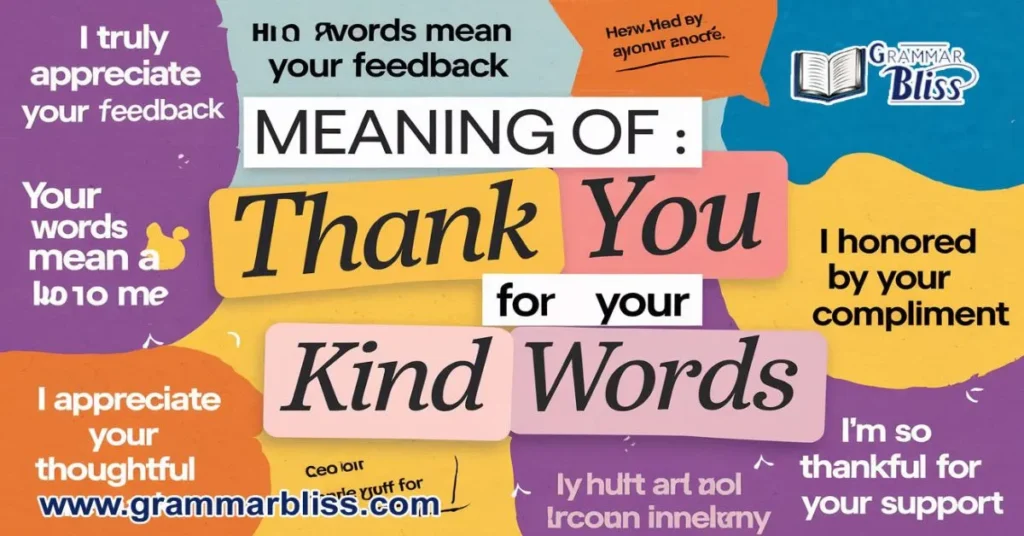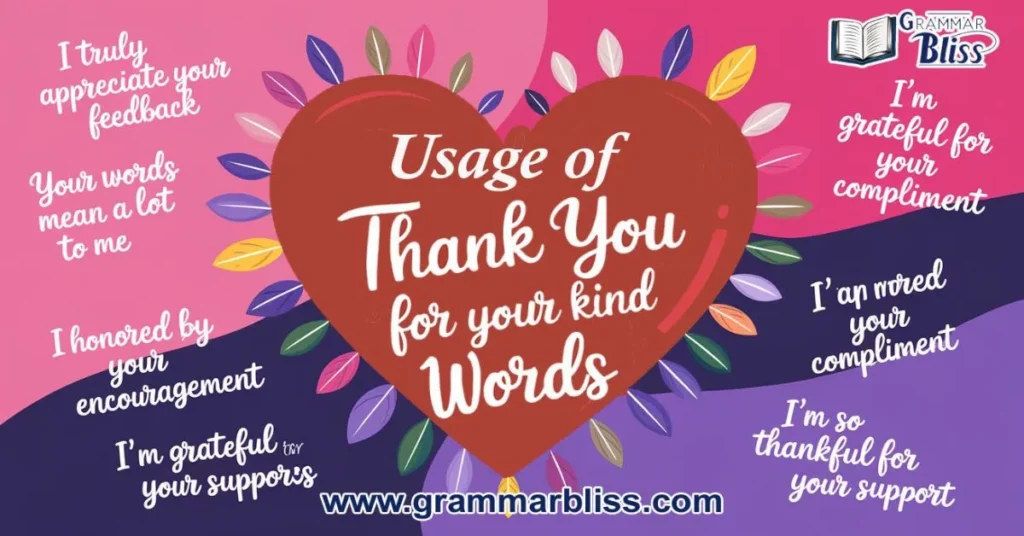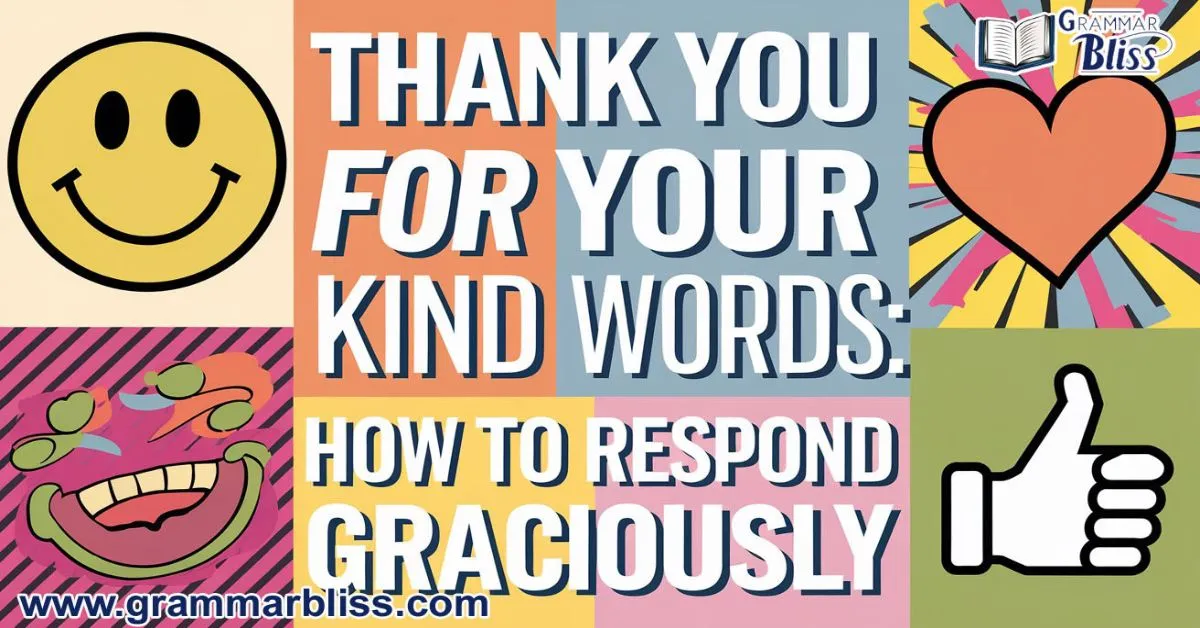In a world where positive feedback and kind words can truly make a difference, knowing how to express gratitude is essential. One of the most sincere ways to acknowledge someone’s compliment or praise is by saying, “Thank You for Your Kind Words.”
This simple phrase holds immense power in strengthening professional relationships, fostering a positive atmosphere, and boosting team morale. Whether you are responding to workplace feedback or expressing appreciation in a more personal context, showing respect and humility with your response can deepen connections. Let’s explore different ways to say thank you, and how it can help you build stronger connections with others.
Quick Summary
At its core, “Thank you for your kind words” is a way to express gratitude and acknowledge the positive comments that someone has made. Whether it’s a compliment about your work, appearance, or behavior, this phrase shows appreciation in both personal and professional settings. Using this phrase allows you to build a meaningful connection with others by responding to their kindness with humility and respect. It’s a simple way to show that you value and appreciate the words of encouragement or praise.
But is this phrase always appropriate? Is it too casual for the workplace or professional settings? Let’s break it down.
Read: 20-sentences-using-modal-verbs-mastering-the-modal-verbs/
Meaning of “Thank You for Your Kind Words”

The phrase “Thank you for your kind words” is a polite and thoughtful way to express gratitude when someone offers you compliments or praise. It acknowledges the supportive comments or encouraging words you received and shows that you appreciate their kindness. This phrase is often used to boost morale and create a positive atmosphere.
When you say this phrase, you are not only acknowledging kindness but also expressing humility. It’s a great way to ensure that the person who gave you the compliment feels recognized and appreciated for their positive remarks. Additionally, it’s a simple yet effective way to foster good communication, whether it’s in a personal relationship or a professional relationship.
Usage of “Thank You for Your Kind Words”

You can use “Thank you for your kind words” in a variety of situations, both formal and informal. For instance, in a workplace setting, if a colleague or manager offers praise for your hard work or contribution, responding with this phrase shows that you value their positive feedback. It can also be used in more casual situations, like when a friend compliments you on your appearance or your efforts in a team project.
In formal thank-you notes or emails, this phrase can add a touch of sincerity. For example, after a team project, you could write: “I truly appreciate your support and the kind words you shared during our meeting.” This shows that you value their encouragement and respect their insight.
On the other hand, in casual conversations, saying “Thank you for your kind words” is a way to express gratefulness and maintain a polite, respectful tone without being overly formal. Whether in the office or among friends, this phrase is a reliable choice to express thanks for compliments.
“Thank You for Your Kind Words”: Is It Professional to Say?
The question often arises: is it professional to say “Thank you for your kind words” in a business context? The answer is yes, but it depends on the situation. In professional settings, you may receive feedback or praise for your efforts, and using this phrase can show that you are humble and appreciative. It encourages open communication and helps to build respect between colleagues, managers, or clients.
However, in certain professional environments, especially where a more formal tone is required, you may prefer using formal gratitude expressions like “I am grateful for your feedback” or “I sincerely appreciate your support.” These alternatives maintain a professional tone while still expressing your appreciation for the positive remarks.
On the flip side, if you’re working in a more relaxed or creative setting, “Thank you for your kind words” can be a great way to maintain a positive connection with coworkers or clients. It’s a perfect phrase to use when building trust and mutual respect in workplace relationships.
Learn: the-author-states-synonyms-to-enhance-your-writing/
Advantages and Disadvantages of Saying “Thank You for Your Kind Words”
There are numerous benefits to using the phrase “Thank you for your kind words”, but like anything, it’s important to understand when and how to use it. Let’s take a closer look at both the advantages and disadvantages of this phrase.
Advantages
- Strengthens relationships: Whether in a personal relationship or professional relationship, expressing gratitude reinforces connections. Saying thank you for positive remarks builds a respectful and appreciative atmosphere.
- Fosters a positive environment: Responding with kind words in return encourages an ongoing exchange of supportive comments and motivational feedback.
- Boosts morale: When you acknowledge the praise or encouraging words of others, it can boost team morale and create a culture of positivity and gratitude.
- Demonstrates humility: Saying thank you in response to compliments shows that you are humble and willing to recognize the kindness of others.
Disadvantages
- Overuse may seem insincere: If you say it too frequently without genuinely feeling appreciative, it can come across as disingenuous or overly formulaic.
- Can be perceived as self-congratulating: If used incorrectly, it may give the impression that you’re congratulating yourself rather than simply thanking someone for their encouragement.
- Might feel overly formal: In more casual settings, the phrase could feel out of place if not used thoughtfully. It’s important to gauge the tone of the conversation to determine whether this phrase is fitting.
Alternatives for “Thank You for Your Kind Words”
While “Thank you for your kind words” is a great phrase, there are plenty of other ways to express gratitude for compliments or positive feedback. Depending on the situation, you may choose one of these alternatives:
I truly appreciate your feedback
Meaning: Expressing genuine gratitude for someone’s opinion or remarks.
Example: “I truly appreciate your feedback on my report; it really helped me improve it.”
Your words mean a lot to me
Meaning: A heartfelt way of saying that the compliment or praise is significant to you.
Example: “Your words mean a lot to me, and they give me the confidence to keep going.”
I’m grateful for your encouragement
Meaning: Thanking someone for supporting and motivating you.
Example: “I’m grateful for your encouragement during the project; it made all the difference.”
That’s very uplifting to hear, thank you
Meaning: Acknowledging that the words have boosted your spirits.
Example: “That’s very uplifting to hear, thank you for your kind comments.”
Your praise motivates me to keep doing my best
Meaning: Saying that the compliment drives you to continue excelling.
Example: “Your praise motivates me to keep doing my best at work, thank you!”
I’m honored by your compliment
Meaning: Expressing gratitude in response to a thoughtful or respectful compliment.
Example: “I’m honored by your compliment about my leadership skills.”
I appreciate your thoughtful remarks
Meaning: Showing gratitude for comments that are considered and insightful.
Example: “I appreciate your thoughtful remarks about my presentation; they were very helpful.”
Thank you, I’m flattered by your kind words
Meaning: A polite way to acknowledge that you feel honored by the compliment.
Example: “Thank you, I’m flattered by your kind words about my work ethic.”
I’m so thankful for your support
Meaning: Expressing appreciation for someone’s ongoing encouragement.
Example: “I’m so thankful for your support throughout the project. It means a lot.”
I really appreciate you taking the time to say that
Meaning: Acknowledging that you value the time someone spent offering feedback.
Example: “I really appreciate you taking the time to say that; it made my day!”
Your kind words are much appreciated
Meaning: A formal and polite way to express gratitude for someone’s words.
Example: “Your kind words are much appreciated, especially during a stressful time.”
I’m grateful for your kind feedback
Meaning: Showing appreciation specifically for positive feedback.
Example: “I’m grateful for your kind feedback on my performance review.”
Thank you for your thoughtful comments
Meaning: Acknowledging that the compliment was well-considered and meaningful.
Example: “Thank you for your thoughtful comments; they helped me understand where I can improve.”
I appreciate you recognizing my efforts
Meaning: Expressing gratitude when someone acknowledges your hard work.
Example: “I appreciate you recognizing my efforts on this project.”
I feel truly blessed to hear that
Meaning: A warm and heartfelt way to express how special the words are to you.
Example: “I feel truly blessed to hear that you enjoyed my presentation.”
Your words have made my day
Meaning: A way to say that the compliment or praise has had a positive impact.
Example: “Your words have made my day, thank you so much for the kind gesture.”
Thank you for taking the time to say that
Meaning: Acknowledging that the person made an effort to offer their positive remarks.
Example: “Thank you for taking the time to say that about my recent work!”
That was such a lovely thing to say, thank you
Meaning: Expressing gratitude for a sweet or charming compliment.
Example: “That was such a lovely thing to say, thank you for your kindness.”
I appreciate your positive feedback
Meaning: Thanking someone for their encouraging or constructive comments.
Example: “I appreciate your positive feedback on my new ideas during the meeting.”
You’ve made me feel appreciated, thank you
Meaning: Acknowledging that the person’s kind words have made you feel valued.
Example: “You’ve made me feel appreciated, thank you for the wonderful compliment.”
Explore: well-received-meaning-usage-and-synonyms/
Grammar Rules and Examples
When using the phrase “Thank you for your kind words”, there are some simple grammar rules to keep in mind. First, the phrase is typically used to respond to positive feedback, whether spoken or written. Here are some examples of correct usage:
- In a professional email: “Thank you for your kind words regarding my presentation today.”
- In a casual conversation: “I really appreciate your kind words, they made me feel better after a tough day.”
Remember, this phrase is a polite and sincere response, so it’s essential to be genuine when you use it. Don’t overthink it—just let your words come naturally. It’s also important to pair it with meaningful follow-up actions when necessary, like a thank-you note or an encouraging response.
FAQ’s
What does “Thank You for Your Kind Words” mean?
It expresses gratitude for someone’s compliment or positive remarks.
Is it professional to say “Thank You for Your Kind Words”?
Yes, it’s a polite and professional way to acknowledge compliments in both personal and workplace settings.
How can I respond to someone’s compliment without sounding too formal?
You can use casual alternatives like “I really appreciate that” or “That means a lot to me.”
Can “Thank You for Your Kind Words” be used in a workplace setting?
Yes, it’s a respectful and encouraging way to acknowledge positive feedback in a professional environment.
What are some alternatives to “Thank You for Your Kind Words”?
Alternatives include “I appreciate your feedback,” “Your words mean a lot,” and “I’m grateful for your encouragement.”
Conclusion
Saying “Thank You for Your Kind Words” is a powerful way to show gratitude and appreciation for someone’s compliment or positive feedback. Whether in a professional or personal relationship, acknowledging their kindness fosters respect and creates a positive atmosphere. By incorporating sincere expressions of thanks, you not only build trust but also encourage a cycle of encouragement and motivation. No matter the setting, taking the time to express your gratitude is an impactful way to strengthen relationships and make others feel valued.

